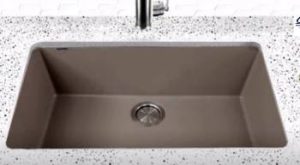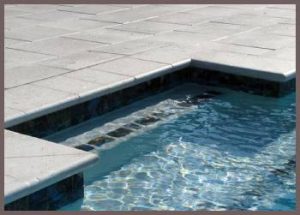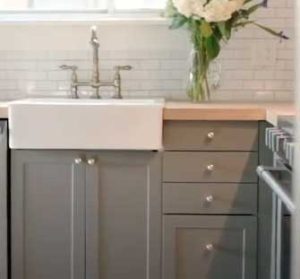In the world of flooring, Aqua Shield has carved a niche for itself as a renowned brand offering top-of-the-range waterproof vinyl flooring. An in-depth look at various Aqua Shield Flooring reviews and firsthand experiences reveal a mixed bag of opinions, praises, and criticisms.
Let’s embark on this enlightening journey to uncover the pros and cons of this flooring option.
The Allure of Aqua Shield Flooring: Pros
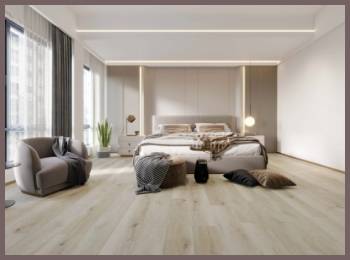
- Unrivalled Waterproof Capability
The absolute standout feature of Aqua Shield Flooring is its 100% waterproof quality. This makes it an ideal choice for areas prone to water exposure like bathrooms, kitchens, and basements. If you’re in search of the most waterproof vinyl flooring, Aqua Shield is the brand to consider.
- Impressive Durability
Durability is a non-negotiable factor when investing in flooring. Aqua Shield offers high-grade, durable flooring. It’s resistant not only to water, but also to daily wear and tear, thereby ensuring longevity.
- Aesthetically Pleasing Designs
Aqua Shield Flooring doesn’t compromise aesthetics for functionality. The brand offers an array of designs, textures, and colors that mimic the appeal of hardwood or stone, delivering a high-end look without breaking the bank.
Read More: About NuCore Rigid Core Flooring
Evaluating the Shortfalls: Cons of Aqua Shield Flooring
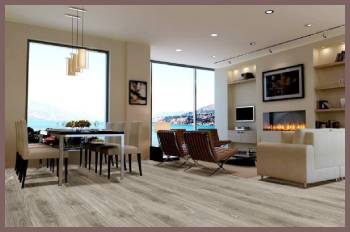
- Potential for Scratches and Dents
Despite being robust, Aqua Shield Flooring is susceptible to scratches and dents, particularly from heavy furniture or pet claws. This can impact the visual appeal over time.
- Limited Warmth and Comfort
Unlike traditional hardwood or carpet, Aqua Shield Flooring may not provide the same level of warmth and comfort. This may not be an issue for everyone, but it’s something to keep in mind.
- Installation Complexity
Although Aqua Shield boasts an easy-install feature, some users find the process challenging. Not all DIY enthusiasts might find the installation process straightforward, potentially necessitating professional assistance.
The Great Debate: Aqua Shield vs. Laminate
When it comes to the best waterproof flooring, there’s a constant battle between vinyl and laminate. Both have their pros and cons, but Aqua Shield Flooring outshines laminate in terms of water-resistance. While laminate offers some resistance to moisture, it can’t compete with the 100% waterproof capabilities of Aqua Shield.
Delving into the Details: Aqua Shield Flooring Thickness
Thickness is an important consideration in flooring, contributing to comfort and sound absorption. Aqua Shield Flooring offers a good range of thicknesses, with many options exceeding the standard 4mm in the vinyl flooring industry. This, coupled with an underlayment, provides added cushioning and sound dampening, making it a worthy contender in the flooring market.
Frequently Asked Questions (FAQs)
Aqua Shield Flooring is often touted as the most waterproof vinyl flooring. Its construction includes a watertight core and protective top layer, ensuring complete resistance to moisture.
Yes, waterproof vinyl flooring is generally worth it. It’s particularly beneficial for areas prone to water exposure, and it helps prevent damage due to spills or humidity. However, the worth of waterproof vinyl flooring also depends on specific needs and lifestyle.
The pros of waterproof vinyl flooring include its water resistance, durability, variety of designs, and cost-effectiveness. The cons, on the other hand, include susceptibility to scratches, limited warmth and comfort, and potential complexity in installation.
In terms of water resistance, vinyl flooring outperforms laminate. While laminate can withstand minor spills if cleaned promptly, it can warp or get damaged with prolonged exposure to water. On the other hand, vinyl flooring, particularly Aqua Shield, can withstand water exposure without damage, making it a superior choice for waterproof flooring.
A good thickness for waterproof vinyl flooring is typically around 4mm to 6mm. However, Aqua Shield offers options that exceed this standard, providing better sound absorption and comfort underfoot.
Vinyl flooring, specifically from brands like Aqua Shield, is often referred to as being 100% waterproof due to its superior construction that prevents water penetration.
Read More: About Paradigm LVP Flooring
Comparing Aqua Shield with Close Competitors
When considering waterproof flooring, several brands go head-to-head with Aqua Shield. Let’s explore how they stack up against each other.
Aqua Shield vs. COREtec
COREtec, like Aqua Shield, is celebrated for its waterproof vinyl flooring. While Aqua Shield excels in waterproofness and aesthetics, COREtec stands out with its innovative core structure that provides extra stability and comfort underfoot. However, COREtec often comes with a higher price tag, which may be a deciding factor for some.
Aqua Shield vs. Pergo
Pergo offers both laminate and vinyl flooring, but its laminate line is more popular. Although Pergo’s laminate has some degree of water resistance, it falls short of Aqua Shield’s 100% waterproof vinyl. However, Pergo may offer a more authentic wood feel compared to Aqua Shield’s vinyl.
Aqua Shield vs. LifeProof
LifeProof is another prominent player in the waterproof vinyl flooring industry. Both Aqua Shield and LifeProof offer 100% waterproof flooring, robust durability, and an array of designs. However, LifeProof has the advantage of an innovative rigid PVC core, known as ISOCORE, which reduces sound transmission and increases comfort. Pricing between the two brands is competitive, often coming down to specific style choices.
Wrapping Things Up
In summary, Aqua Shield Flooring has carved a unique niche in the market with its high-quality waterproof vinyl flooring. Despite a few potential downsides, it is a worthy contender, holding its own against fierce competition.
Each flooring choice has its strengths and weaknesses, and the best pick ultimately depends on individual needs, preferences, and budget.

